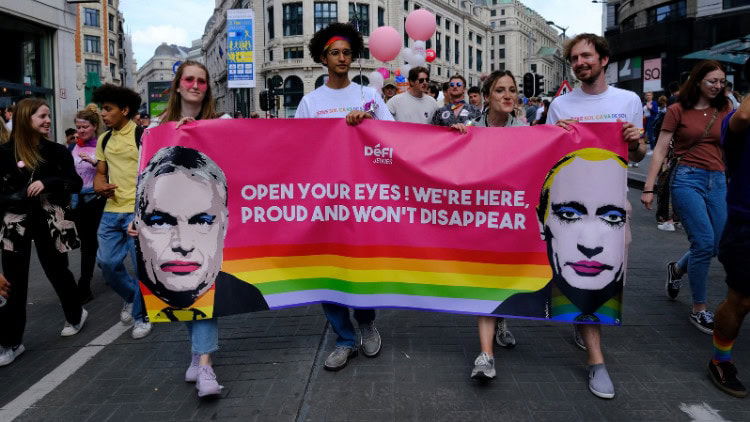Vladimir Putin looks to be a big winner from the far-right surge in the recent European Parliament elections.

Not content with only exercising control over former Soviet Union members, the Kremlin is increasing its support across the rest of Europe. One significant symbol of the pro-Russia swing was the decision by the far-right Alternative für Deutschland party (AfD) to refuse to attend the speech by the Ukrainian president, Volodymyr Zelenskyy, to the German Bundestag on June 11th, along with the populist Bündnis Sahra Wagenknecht. Both parties oppose military support for Ukraine.
The AfD, which won 16 per cent of the vote in the European elections in Germany, beating Olaf Scholz’ social democrats into second place, said that Ukraine’s leader ‘needed to negotiate so the dying stops’, even if this meant losing its territory. These remarks echo the stance on the war of the Russian president, Vladimir Putin.
After the elections, two far-right groups—the European Conservatives and Reformists and the Identity and Democracy group—control 131 seats out of 720 in the parliament. AfD has another 15 representatives. This adds up to a significant parliamentary far-right power base, and one which will have more influence over Europe’s position on the Ukraine war.
Concerns about German far-right parties being too close to Putin prompted a European Parliament resolution in April stating that the AfD must publicly declare all of its financial relationships, especially with Russia. One might think that the alliance between a supposedly anti-fascist Russian regime and the increasingly fascist right-wing parties in Europe would not be a perfect match.
But Russia inspires, encourages and funds extremist actors, whether they are pro-Moscow or not. Why? Because they can disrupt other countries.
Far-right threats
Putin has skilfully influenced and infiltrated agendas of far-right groups, while also building up an extensive spy network in Europe. Propaganda operations disguised as legitimate news sources have spewed confusing and divisive information that promotes pro-Kremlin narratives, such as the claim the cost-of-living crisis is being driven by sanctions on Russian energy products.
It is not just Germany’s far right that is sympathetic to Russia but also far-right parties in many other European countries, including Slovakia’s neo-fascist Republika, Hungary’s Fidesz, Romania’s Alliance for the Union of Romanians, Bulgaria’s Revival and France’s Rassemblement National. All these parties did well in the recent elections and many of their leaders, such as Hungary’s Viktor Orbán, have been vocal opponents of Russian sanctions.
Many far-right politicians in the European Parliament have also refused to vote on policies that aim to punish or criticise Putin or Russia. This includes stances on how to respond to repression in Russia, the imprisonment of the human-rights activists Vladimir Kara-Murza and Alexei Navalny, who died in a penal colony, and Russian state support for terrorism. There is also the issue of security in the Eastern Partnership initiative, which aims to strengthen the political-economic relationship between the European Union and partner countries in the south Caucasus.
Exploiting the European far right offers Putin numerous benefits. These parties tend not to be committed to upholding the institutions of democracy, especially if they are seen as obstacles to enacting conservative policies, such as tougher immigration laws or curtailing LGBT+ rights.
The free flow of information and a vibrant civil society pose major threats to Putin’s grip on power. But Russia offers a model of policies and laws that will erode these rights. These include ‘foreign agent’ laws restricting funding for non-governmental organisations and independent media, which have passed in Russia, Hungary and most recently Georgia.
The more authoritarian the world is, the less likely it is that democratic voices within Russia will be supported by other nations. It is not just democratic countries that pose problems for Putin but also intergovernmental institutions, such as the EU, which advocate an agenda based on human rights and democracy. Putin sees a united EU and its opposition to Moscow’s illiberal vision as a threat. So he seeks to sabotage the west by weakening democratic projects within the union.
Putin also benefits from the disarray he creates in European national political landscapes. This could lead to a less unified North Atlantic Treaty Organization, which is another major obstacle to Russia’s ambitions and has the power to increase the supply of arms to Ukraine.
New world order
Russia’s fight against the world order in place since the end of the cold war resonates with far-right parties. They often talk of ‘globalist’ forces, which they view as threatening to their national sovereignty and cultural identity. Putin is seen by the far right as a strong and conservative leader who can defend himself against the liberal west, which is trying to undermine these values.
Russia’s move to become more right-wing, authoritarian and anti-western has served as an anti-liberal role model. The far right also appears to echo Putin’s stance on ‘traditional’ family values, which typically include men taking leadership positions and women staying at home to look after children.
Putin will be delighted to see these allies doing well in the recent elections and gaining more power, which can only be helpful to him. Far-right parties only held 1 per cent of the vote in EU member states in the 1980s but this rose to 10 per cent in the 2010s. Today they are poised to hold more political power than ever before.
But there are splits in the far right—one of the most divided political groups in Europe. For instance, the Italian prime minister, Giorgia Meloni, is generally supportive of the sanctions on Russia and has not joined the pro-Russia faction. This contrasts with France’s far-right leader, Marine Le Pen, who has had personal and political ties with Putin and is against arming Ukraine.
The role that these far-right parties play in the upcoming years will have serious implications for European democracy and stability. The issues facing Europe are enormous and the rise of the far right is further evidence of not just the genuine Angst brewing over cost-of-living and identity issues but also Russia’s expertise in psychological and information warfare.
This article is republished from The Conversation under a Creative Commons licence
Natasha Lindstaedt is a professor in the Department of Government at the University of Essex. Her research interests are authoritarian regimes, populism, failed states, international development and violent non-state actors.

